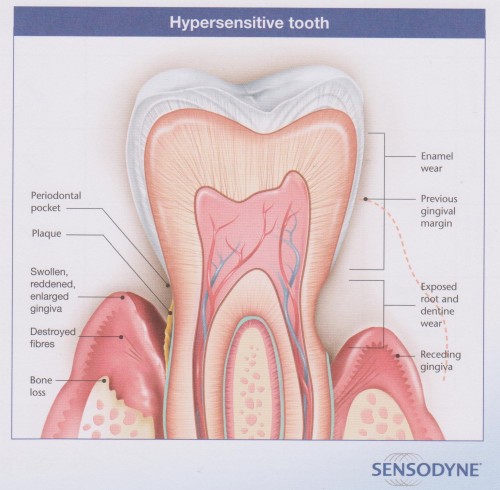Tooth sensitivity affects many Australians. It can be an unpleasant experience when cold or sweet foods and drinks are consumed which can lead to avoidance and displeasure of certain foods and beverages. If you wince or have reactions while brushing or consuming cold items such a ice-cold water, you may be suffering from sensitive teeth.
Tooth sensitivity is caused when the harder layer of the tooth- the enamel- is worn away to expose the more sensitive layers of the tooth- the dentine (the second layer on the crown of the tooth) and the root surface of the tooth.

Image courtesy of GSK Sensodyne
Common causes for this is:
1. Receding gums
2. traumatic or aggressive tooth brushing technique- using a medium/hard toothbrush and/or scrubbing the teeth with excessive pressure can abrade tooth enamel
3. dental erosion or chemical wear, most often causes by increased soft drink consumptio
4. Tooth grinding causing abfraction lesions
5. Chipped enamel
6. Gum Disease- due to inflammation, can cause recession.
7. Tooth decay
8. Dental treatments- placing restoration, tooth whitening and general cleans can cause sensitivity- this is usually temporary!
When the enamel is damaged, the underlying structures of the teeth have small pores or tunnels which can now relay messages to the nerve of the tooth to register temperature change and cause sensitivity. This can range from occasional, sporadic episodes to more regular, intense sensitivity which can interfere with everyday living.
If you have sensitive teeth it is best to avoid:
– Whitening-based, baking soda or other abrasive toothpastes
– Over use of whitening products- use a lower percentage of hydrogen-peroxide products and use in conjunction with sensitive toothpaste or tooth mousse products
– Minimise or avoid acidic foods and beverages- this includes soft drinks, salad dressings and citric fruits such as oranges. When having sugary or cold drinks, have it through a straw to reduce sensitivity.
– Use a soft or ultra soft toothbrush (never a medium or hard one)
– Use a sensitive toothpaste to help desensitise the tooth nerve and reduce tooth sensitivity. DO NOT rinse with water after use, it will work most effectively if residue stays in contact with the tooth.
– Avoid over-brushing or using a scrubbing motion when brushing. Use gentle, circular motions to brush along gum lines. If you are finding it hard to adapt to this technique- try an electric toothbrush.
If you experience sensitivity, it is important to let your dentist or dental hygienist know. While it may be due to structural changes through abrasive or chemical wear, there may be a pathological cause for it- such as tooth decay. Our dental professionals will advise you the best approach to manage your sensitivity- this can vary from topically application of sensitive toothpastes, professional desensitising agents or placement of restorations. The aim of treatment is to block the tubules that send the message to the nerve of the tooth to stop sensitivity symptoms.
Make an appointment by calling our office 03 5223 1555 and find out how you can manage your sensitivity.
Return to blog

